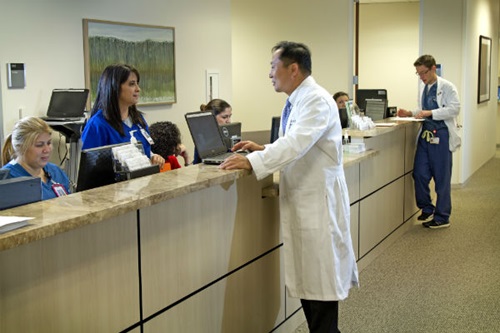
Spinal discs are located between the vertebrae in the back, and they serve as shock absorbers and enable bending, twisting and flexibility in a young, healthy back.
As the body grows older, these spinal discs shrink. In some cases, this shrinkage causes stiffness and discomfort because the vertebrae rub together.
Although almost all people will experience some degeneration of their spinal discs as they age, not everyone will have back pain. People with degenerated discs, who also have pain not caused by another condition, are thought to have degenerative disc disease.
Common Causes of Degenerative Disc Disease
Some people may be predisposed genetically to developing degenerative disc disease and, in rare instances, this condition may also occur because of trauma. However, in most cases, degenerative disc disease is caused by wear and tear of the spinal discs as a result of aging, strenuous daily activities and/or sports.
Symptoms of Degenerative Disc Disease
Although most patients experience a low level of continuous, intensifying back pain over certain periods, symptoms of DDD can vary. This pain is usually caused by inflammation of the nerves which surround the discs or when the annulus fibrosus, the outer rings of the spinal disc, become so worn down, they can no longer absorb force or stress. Other symptoms include:
- Periods of severe pain that comes and goes which affects the lower back, buttocks and thighs
- Pain in the neck which may radiate to the arms and hands
- Pain that becomes worse when sitting
- Worsening pain when bending, lifting or twisting
- Feeling better while walking or running than when sitting or standing for long periods of time
- Feeling better after lying down or changing positions often
- Numbness and tingling in the extremities
- Weakness in the leg or foot muscles
3 Common Degenerative Disc Disease Myths
1. Myth: DDD is a disease.
Fact: Despite the name, DDD is not technically a “disease”, rather it is a term that describes the changes which occur in the spinal discs as the body ages.
2. Myth: DDD only affects older people.
Fact: While this condition more commonly affects the elderly, it can certainly affect younger people between the ages of 25 and 55. Active young and middle-aged adults can be affected by degenerative disc disease, even if they are otherwise in good health. Familial history of the condition and smoking also increase the risk of developing degenerative disc disease.
3. Myth: DDD is a natural part of aging, so there is nothing anyone can do to prevent symptoms.
Fact: While degenerative disc disease cannot be prevented, you can delay the onset of symptoms by exercising and staying active to increase core strength and flexibility around the spine, maintaining good posture and avoiding smoking.
Diagnosing Degenerative Disc Disease
The spine specialists affiliated with Memorial Hermann Mischer Neurosciences utilize a variety of tests to diagnosis DDD including:
- Medical History
- Physical exam to test muscle strength and range of motion
- MRI
Treatment Options for Degenerative Disc Disease
Most cases of DDD can be treated with medications, such as nonsteroidal, anti-inflammatory drugs or pain relievers, heat or ice applications or physical therapy. Patients who still experience pain or are significantly restricted in their daily movements after the application of these conservative methods, may consider surgery to remove the deteriorated disc and fuse the vertebrae.
Contact Us
Please fill out the fields below, and we will contact you.